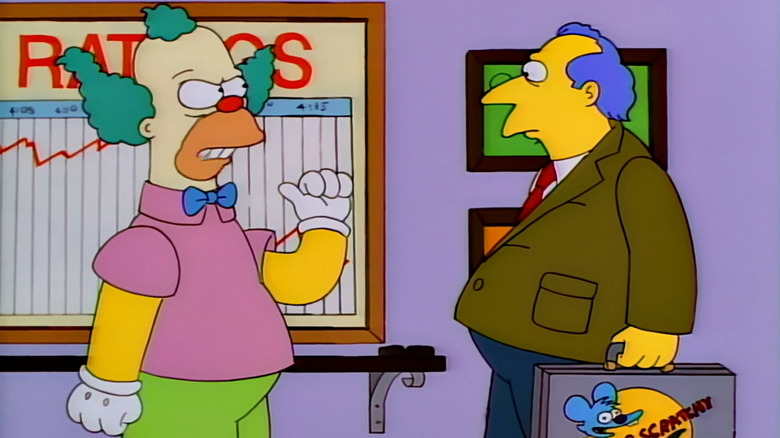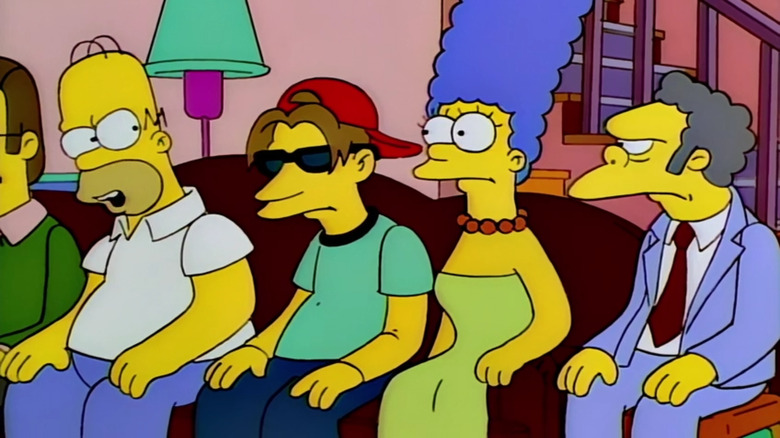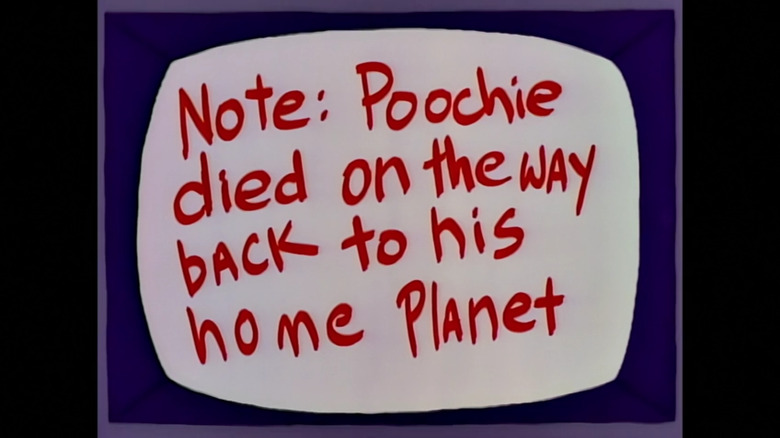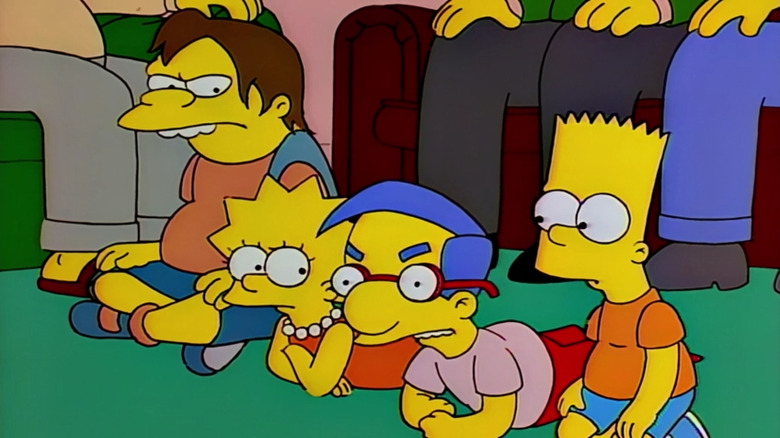The Simpsons Writers Know They Can't 'Compete' With Classic-Era Episodes
In a season 8 episode of "The Simpsons," Bart and Lisa get to be part of a focus group for their favorite cartoon, "The Itchy and Scratchy Show." The people running the focus group are desperate to figure out why the show's ratings are going down even though kids still seem to like the recent episodes, and Lisa (the closest thing to the show's voice of reason) helpfully explains: "There's not really anything wrong with 'The Itchy and Scratchy Show,' it's as good as ever. But after so many years, the characters just can't have the same impact they once had."
If it wasn't clear already, this is the moment signaling that the characters aren't really talking about "Itchy and Scratchy," but about "The Simpsons" itself. Season 8 seems like an early season of the show today, but that's definitely not how it seemed at the time. Current co-showrunner Al Jean, who first became a showrunner back in season 3 (it's complicated) has remarked, "I've been hearing the show has been going downhill since season two."
Back when it was only forty episodes into its 700+ episode tenure, people were already speculating that the show was running out of steam. You can even see this reflected as early as the season 3 "Treehouse of Horror" segment "Monkey's Paw," in which the Simpson family becomes famous and everyone starts to hate them. "At first they were cute and funny, but now they're just annoying," one woman says. The writers of "The Simpsons" were always acutely aware that the tide could turn on them at any moment.
Long past its golden era, but still having fun
If there's a moral in "The Itchy & Scratchy & Poochie Show," it's that a cartoon losing its edge over time is somewhat inevitable, but it's not a big cause for alarm. The best thing a show can do in a case like this is to avoid any moves that seem too desperate, like introducing a massive status-quo-changing character in a misguided attempt to make things fresh again. That's why the same episode has a running gag of a new character named Roy, who's inexplicably living with the Simpson family now. "I'm movin' into my own apartment with two sexy ladies," Roy tells the family at the end of the episode. Much like Poochie, we never see him again.
Since then, "The Simpsons" has mostly avoided any sort of jumping-the-shark moment like this. (The closest thing would probably be the Principal Skinner episode in season 9.) The main cast has stayed the same over the thirty-three seasons; they've never attempted to add in a Poochie-esque character. Instead, "The Simpsons" has gradually lost its cultural impact simply because it's been around for so long and there are only so many jokes and storylines to be had with these five main characters. There are still occasional gems in late-season episodes, but mainly the show just feels tired. How do you keep the show fresh when you've seemingly tackled every sort of storyline?
The nostalgia factor
Al Jean also attributes the difference in reception to the viewers' age. "With an adult watching a current episode, it's very hard to compete with something they saw when they were 10 years old," Jean said. "I remember when I was 10, reading Spider-Man comics with Steve Ditko, the artist. And it's hard for anything to compare to those, because you're a kid and you're discovering it."
There's some truth to this; much like "Saturday Night Live," a lot of "Simpsons" viewers have a soft spot for whatever seasons aired during their adolescence. However, this can really only explain so much, which Jean is also willing to acknowledge. "I would be remiss if I didn't take valid points to heart," he said, going on to explain how the recent show has addressed a lot of common fan complaints.
Those complaints include Lisa getting too mean to Bart over the years, Homer turning into too much of a jerk, and Ned Flanders getting too cartoonishly religious; these have all been addressed by the show in recent years. Flanders in particular is no longer as much of a religious extremist as he used to be. Back in season 12, Flanders is reading the Harry Potter books to his kids, ending the story with his own take: "...And Harry Potter and all his friends went straight to hell for practicing witchcraft!" Then he throws the book into the fire as Todd cheers. It's hard to imagine that joke working for season 33's Ned Flanders, because the writers have long since realized they'd gone too far and started dialing him back.
Not canceled yet!
Despite the writers' willingness to listen to viewer feedback, there are still plenty of other problems the show has to deal with as it trudges on. There's the fact that the voice actors are getting older, which has already led to the departure of characters like Edna Krabappel, and has caused Marge's voice to sound a lot more strained than it used to. There's the fact that the show's timeline no longer makes any sense (and no longer even tries to), or that there's simply not much ground left to cover between so many core characters.
Despite that, the show still goes on, so it must be doing something right. The new episodes may not be on the same level as season 4, but the "Zombie Simpsons" critique might be going too far. As Al Jean put it: "I believe that the truth lies somewhere between people going, 'It's not funny at all,' and 'Oh, it's, you know, not quite as good as the best it's ever been.' It's obviously in the middle of that."
He also points out that "The Simpsons" is still winning awards in its old age. In 2019 the show won the Outstanding Animated Series Emmy for "Mad About the Toy," an episode that dove deep into Abe Simpson's past. "If the standards of The Simpsons have fallen," Jean said, "so have the standards of the Emmys."



